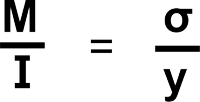Simple Bending Equation: Difference between revisions
From DT Online
m (Corrected Links) |
(Added Template) |
||
| Line 1: | Line 1: | ||
__TOC__ | |||
=====Description===== | |||
The [http://en.wikipedia.org/wiki/Bending '''Simple Bending Equation'''] applies to simply supported beams ''(and arches if the radius of curvature is greater than 10 times the depth)'' | The [http://en.wikipedia.org/wiki/Bending '''Simple Bending Equation'''] applies to simply supported beams ''(and arches if the radius of curvature is greater than 10 times the depth)'' | ||
| Line 9: | Line 14: | ||
* Capital '''I''' = the '''[[Moment of Inertia]]''' about the Neutral Axis ''(for a rectangular beam this is its breadth times the depth cubed divided by 12)''. | * Capital '''I''' = the '''[[Moment of Inertia]]''' about the Neutral Axis ''(for a rectangular beam this is its breadth times the depth cubed divided by 12)''. | ||
* '''y''' = the distance of the '''[[Neutral Axis]]''' from the maximum stress ''(for a uniform rectangular beam this is half the depth)'' | * '''y''' = the distance of the '''[[Neutral Axis]]''' from the maximum stress ''(for a uniform rectangular beam this is half the depth)'' | ||
{{Construction Kits Buyers Guide}} | |||
Latest revision as of 20:03, 3 September 2016
Description
The Simple Bending Equation applies to simply supported beams (and arches if the radius of curvature is greater than 10 times the depth)
Where:
- M = the Maximum Bending Moment
- σ = the Tensile Strength of the material (obtainable from tables or by experiment)
- Capital I = the Moment of Inertia about the Neutral Axis (for a rectangular beam this is its breadth times the depth cubed divided by 12).
- y = the distance of the Neutral Axis from the maximum stress (for a uniform rectangular beam this is half the depth)
|
Click top left to enlarge |









